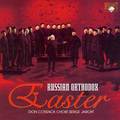Constantine Shvedoff (1886-1954)

Constantine Nikolayevich Shvedoff was one of the younger members of the New Russian Choral School that formed around the Moscow Synodal School of Church Singing in the late 19th and early 20th centuries. As a graduate of the Synodal School, Shvedoff had experienced the renaissance of Russian Orthodox church music in a national style, promulgated by Stepan Smolensky (1848–1909), the School’s director from 1889 to 1901, and embodied in the sacred choral works of Alexander Kastalsky (1856–1926). In his own compositions, he strived to add to the rich body of sacred choral literature produced by his predecessors and contemporaries, among whom were Chesnokov, Gretchaninoff, Nikolsky, and Rachmaninoff. His works range from austere chant harmonizations in two and three parts, in which the folk-song element prevails, to more innovative opuses, such as the present work. Because of their traditional concern for the intelligibility of the word, Russian composers of sacred music have typically avoided contrapuntal writing in the style of imitative polyphony and fugue. With the exception of a few sacred concertos by Dmitry Bortniansky (1751–1825) and one movement in Tchaikovsky’s Liturgy, it may safely be said that there are virtually no fugues in the Russian Orthodox sacred choral repertoire. Shvedoff’s concerto “Blago yest ispovedatisia” thus stands as a unique work, in which fugal writing is combined with the rich harmonic style of the Russian choral school, and a touch of chromatic “orientalism” found in the secular works of the Mighty Five. After the Communist takeover in 1917, Shvedoff emigrated to the West, living out his life in the United States, where he directed a church choir and continued to write choral works, including a number of arrangements for the famous Don Cossack Choir, directed by fellow Synodal School alumnus, Serge Jaroff.

It is truly meet
Let Us Pray to the Most Holy Mother of God; works by composers of the Moscow Synodal School
Male Choir of the Moscow Representation Church of the Holy Trinity-St. Sergius Monastery

From the History of the Original Don Cossack Chorus
Russian Orthodox Easter (Recordings 1948-1950)
Don Cossacks Choir










